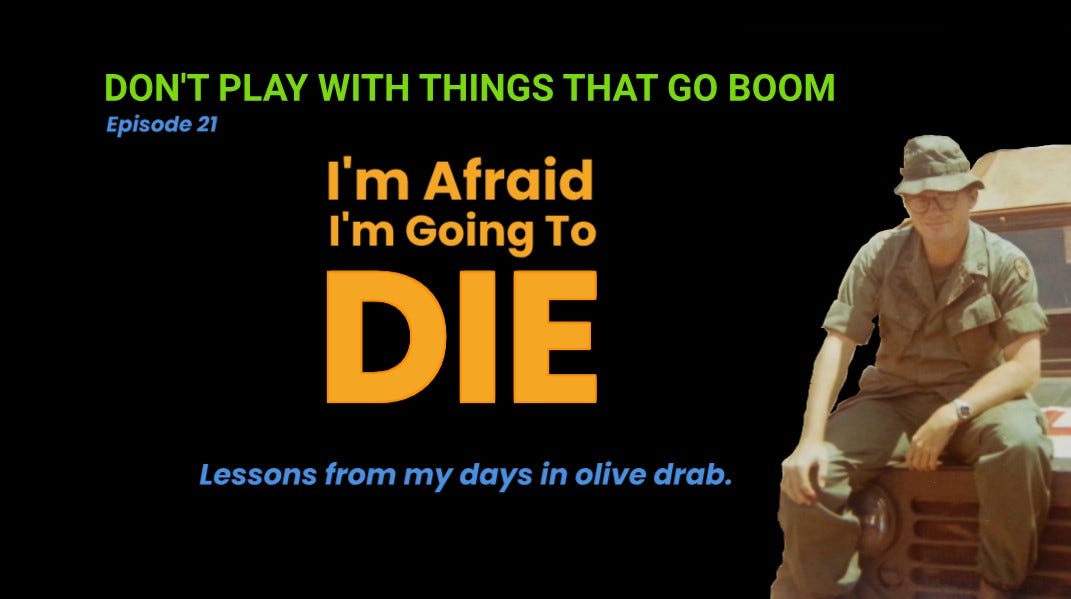During my time at the aid station, Doc provided extensive training to prepare me for medical scenarios, both there and in the field.
I was feeling good about what I had learned, but Doc knew I needed more experiences.
To get those experiences, he arranged for me to receive additional training at the 91st Evacuation Hospital in Chu Lai.
In the next few episodes, I’ll share some of the lessons I learned in that setting.
THE DIVISION PSYCHIATRIST
One of my first experiences was working with the Division Psychiatrist.
I like to think the doctor sent me to the Division Psychiatrist’s Office so I could learn about some of the mental and emotional challenges soldiers face. I’m sure he wasn’t having me evaluated by the psychiatrist.
At least I think I’m sure.
Now I’d previously met the Division Psychiatrist when I was filling out the forms for conscience objector status, so I knew who he was, but I wouldn’t be working with him … I’d be working for him … specifically, for his staff.
The psychiatrist’s staff was a group of enlisted soldiers who helped the psychiatrist do his job for the thousands of soldiers in the Americal Division.
The staff was going to train me in just one of the tasks they had — meeting with soldiers who wanted to see the psychiatrist and preparing a report for the psychiatrist on the soldier and his concerns.
They explained the purpose of those meeting and graciously had me sit in on several such interviews they conducted. And they shared the types of questions to ask in order to gather the information the psychiatrist needed before he met with the patient.
When they felt I was ready, they had me conduct interviews on my own.
I have to admit the process was fascinating. I was meeting with people who were having major struggles in their lives and seeking help.
I wasn’t counseling them. My job was just to listen and ask questions to draw them out so I could report to the psychiatrist why they wanted to meet with him.
Two of the interviews stick out and I still remember them over half a century later.
I DON’T WANT TO BE A DRUGGIE
One soldier I interviewed was nearing the end of his tour. He would be going home. It should have been a happy, feel-good time in his life.
Going home was something all of us looked forward to. Some soldiers could even tell you how many days were left in their tour. It was a big deal.
But the soldier in front of me was not happy. He was not feeling good. He was almost in tears as he explained his situation.
He’d never used drugs before going into the Army. He never wanted to. He thought druggies were bad people who were ruining their lives.
But when he got to Vietnam, so many people were using drugs, and they seemed happy. And the drugs were so cheap. You could buy them for almost nothing.
So, he began to take them. And now he was a regular user.
He was a druggie.
Now his tour was coming to an end and he was going home.
He didn’t want his family or his friends to know that he was an addict. He didn’t want to be an addict.
He wanted the psychiatrist to help him break free of the drug addiction. He wanted to be clean when he went home.
The report to the psychiatrist was easy to write, but I felt for that soldier. He did not want to be an addict. He wanted to be free from drugs. He wanted to be clean. He wanted his life back.
I prayed the psychiatrist could help him, but I knew it would be a difficult journey.
I’M AFRAID I’M GOING TO DIE
The other soldier that I remember clearly came in for his interview, and the first words that came out of his mouth were, “I’m afraid I’m going to die.”
He was serious.
I could tell by his tone of voice and his look that he really believed what he just said.
He was afraid — terrified might be a better word — he was terrified that he was going to die.
As I talked with him and listened to him, I learned he was in the infantry, and they were on a break from the field. An infantry unit would serve in the field for a couple of weeks then their unit would get a few days of a “break” by coming to a rear area for a couple of days. After that short break, they would return to the field.
His unit was about to go back into the field, and he was afraid he was going to die.
He didn’t want to live in fear. That’s why he wanted to see the psychiatrist.
I could understand why he might be afraid. I know I would be afraid. I mean he was in the infantry in a war zone.
Think about that. The infantry guys lived out in the jungle among an enemy that wanted to kill them. The enemy would shoot at them, set booby traps to blow off their legs, attack them when they slept at night, and that was just a normal, everyday experience for them.
I’m actually surprised more infantry soldiers didn’t try to have meetings with the psychiatrist to deal with their fears. Maybe they went to the chaplains.
As I continued to get him to share, I realized it was more than just the “normal” fears one would expect in a war zone.
He explained that when they came back on break, many of his fellow soldiers would find a source of drugs and get high. He wasn’t complaining about them being druggies or getting high on their breaks.
The problem was that many of the soldiers in his unit continued to get high when they were back in the field.
That meant at night when he was trying to sleep, he knew that some of the men who were supposed to be pulling guard duty to protect him were totally zoned out on drugs.
That’s why he was terrified.
When the soldier left the office, I tried to reassure him there was nothing wrong with him. He was right to be concerned and they weren’t unreasonable fears.
I wrote my report for the psychiatrist, but I never found out if the psychiatrist followed up and met with him.
I was moved to my next training area.
LESSONS FROM MY DAYS IN OLIVE DRAB
There were a couple of lessons from my experiences in this psychiatric unit.
We all make mistakes - The Bible teaches that we’re all sinners
It doesn’t help when your friends or society at large encourage you to make those mistakes, but it isn’t a defense to point at someone else and say, “He made me do it!””… for all have sinned and fall short of the glory of God …”
Romans 3:23 (ESV)Ask God to forgive you and choose to follow Jesus.
Facing Danger - Sometimes we are in dangerous situations. That’s when it is very helpful to know that God is aware of your situation and you can rest in Him.
“Peace I leave with you; my peace I give to you. Not as the world gives do I give to you. Let not your hearts be troubled, neither let them be afraid.”
Jesus to his disciples. John 14:27 (ESV)











